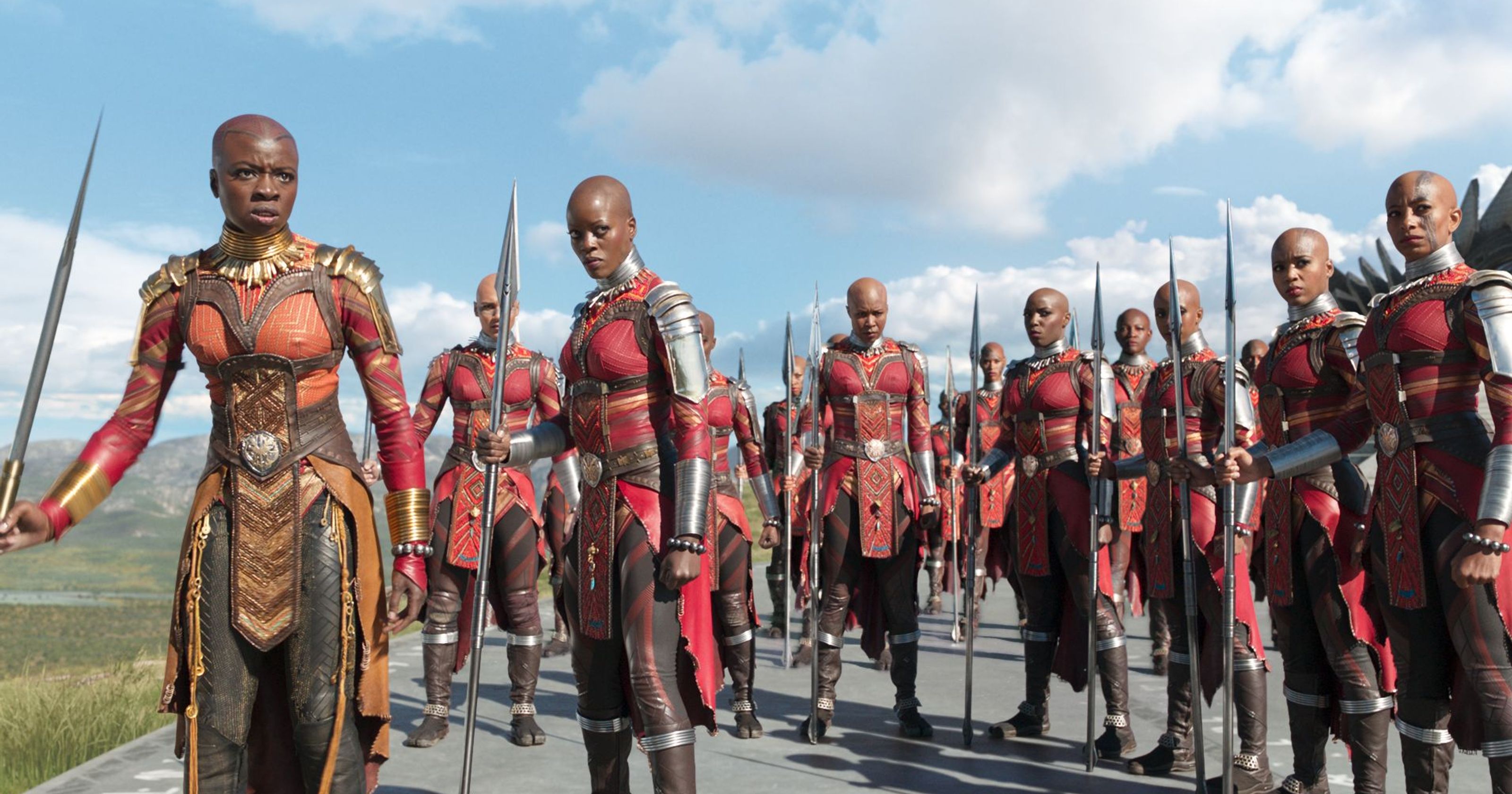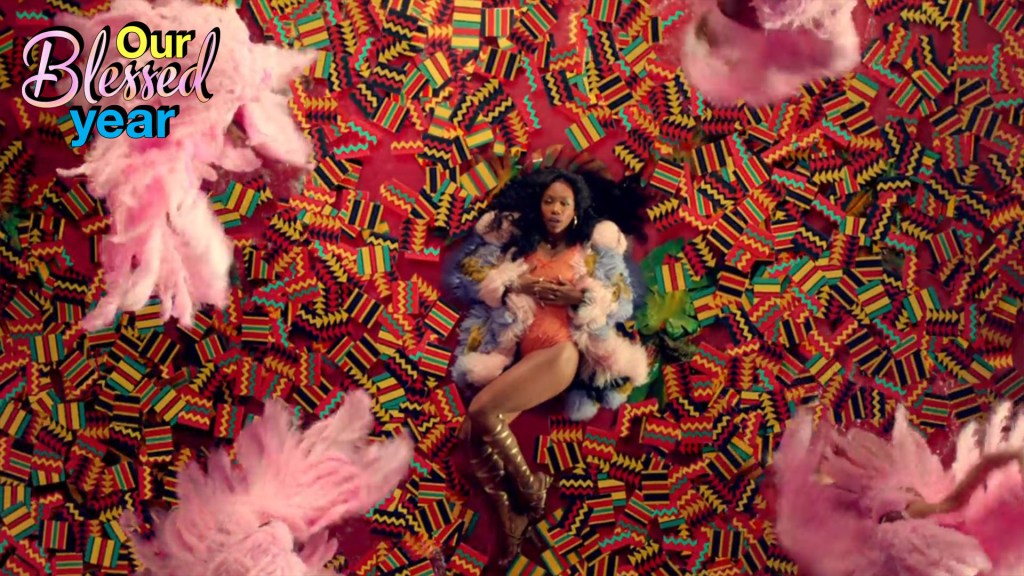Afrofuturism has been a steady undercurrent in black American culture for decades, mostly kept alive by a handful of creatives who use technology and outer space to imagine a sci fi-empowered black future. But in 2018, mainstream mega stars also found it to be the perfect vehicle for escaping the woes of President Trump’s second year in office.
Black Panther buoyed the year with an imagined world that a number of other artists interacted with through their own projects. But the philosophy was present in many corners of the real world too, from celebrity fashion to major live performances and even an increasingly famous black female robot, Bina48, forcing the artificial intelligence community to think about coding blackness.
Videos by VICE
Jay-Z helped ring in 2018 with his futuristic Wakanda-inspired music video for “Family Feud” directed by Ava DuVernay and released just two days before the new year. It opens on a key James Baldwin quote: “The wretched of the earth do not decide to become extinct, they resolve, on the contrary, to multiply: life is their weapon against life, life is all that they have.” Afrofuturism is the resolve to never become extinct. It’s a vehicle for turning inward and reconnecting with a long history of survival to project a future that would be the ultimate survival. It creates distance from oppressive immediate surroundings without retreating. Each cultural moment below helped give the concept new meaning for 2018.

Kendrick Lamar and SZA’s “All the Stars” Music Video
The cinematic image of Kendrick Lamar on a boat heading to Africa in the opening of “All the Stars,” the lead single to the Black Panther soundtrack (which he composed), let everyone know that it’s time to get hella afrocentric and introspective ahead of the film’s release. Released in February, “All the Stars” was a key moment showing mainstream artists adopting African fashion and implying a return to their African ancestry. It was a daring move in today’s anti-appropriation climate, especially because afrocentrism has gotten a bad rep among younger African Americans who reject monolithic views of Africa and claims of ancient Egyptian heritage. But the video also highlights how afrofuturism allows artists to repackage those philosophies that were important to shaping African American culture in new, less literal, ways.
New York Fashion Week’s Black Panther Show
In February, two days before the opening weekend of Black Panther, Marvel outdid themselves by hosting a Wakanda-themed fashion showcase during New York Fashion Week that brought together a number of top black designers to share looks inspired by the movie. The room was designed to evoke a forest as brands like LaQuan Smith, Chromat, TOME, Fear of God, and Ikiré Jones displayed diverse interpretations ranging from full Nigerian Ankara fabric, to silk evening dresses and a sleek leather pant suit. Some designers, like Jones, worked on the actual film and a number of them pulled from their own African heritages to add to Wakanda’s visual world. The star-studded event and subsequent shows, like 19-year-old newcomer Taofeek Abijako’s show at NYFW, helped usher in a year where more designers tried their hand at afrofuturist fashion, dazzling audiences with the tradition’s infinite expressions.
Black Panther
Besides giving us endless meme fodder, the Wakanda salute, the cutest Mbaku impersonator, and an instant list of emerging stars in Hollywood, the Black Panther movie’s global success made it an actual pan-African reunion that would’ve made Marcus Garvey proud. The iconic fashion in the movie, from Angela Bassett’s headdresses to the bad ass Dora Milaje women’s warrior gear, inspired audience members to bring their A game, dressing in Wakanda-inspired garb at movie screenings across the US, and proved to be a solid Halloween costume. Though all the African clothing sported by non-Africans prompted some debates about whether African Americans can appropriate African culture. But overall, it brought afrofuturism roaring into public view through a rich radical story that empowered and ignited pride in blackness in a way that overtook the cultural zeitgeist. Wakanda hiding its technological power and allowing “colonizers” to believe the fictional country was third world is the ultimate analogy for the black experience. Black people still conceal sides of their identity from white people to avoid their culture being stolen or used against them. And the movie itself mirrored this tradition of coded messaging by giving general audiences something to love while leaving deeper messages for black people to delve into.

Children of Blood and Bone
In the wake of Black Panther pandemonium, 24-year-old author Tomi Adeyemi released an epic YA fantasy novel based in West African mythology. Children of Blood and Bone, the first of a trilogy currently being made into a movie by Twilight and The Fault in Our Stars producer Wyck Godfrey, tells the story of the fictional kingdom of Orisha, where an evil dictator has banished historical magic traditions. The protagonist, Zeili, has to reconnect with that banned magic and restore its presence in society. The book brought a particular focus to the spiritual aspect of afrofuturism, and simultaneously animated the real life trend of black Americans turning to Yoruba, voodoo, Santeria, and other pre-colonial ethnic religions in recent years.
Dirty Computer
Janelle Monae did not come to play when she dropped an “emotion picture” for her album Dirty Computer, a short film where an oppressive futuristic government tries to delete her memories. The project pushed the year’s afrofuturism into a more queer, feminist, and hyper-political direction. Previous 2018 afrofuturist phenomenons were largely turning away from current events to create empowering new worlds, but Dirty Computer is tied more specifically to the Trump era and critiques our world through a cautionary tale. She needles Trump on tracks like “I Got the Juice,” singing “If you try to grab my pussy cat, this pussy grab you back.” Even the main plot, about medically erasing queer memories, is partly a reference to Vice President Mike Pence and others on the right having supported gay conversion therapy (which Pence denies). Ultimately, she used her own identity as a bisexual black woman from the conservative heartland of America (Kansas) to stake a claim on the soul of the country.

Afrofuturism in Art
Much of the year in afrofuturism also bubbled up in new exhibits around the globe. In Dortmund, Germany 32 global artists participated in “Afro-tech and the Future of Re-Invention,” an exhibit further exploring the innovations within afrofuturism. While back in the states, Chicago’s Museum of Contemporary Photography hosted an exhibit, “In Their Own Form,” that brought together thirteen visual artists from the U.S. and abroad to share their visions of technology and heroism in afrofuturism. Also in Chicago, the first ever WakandaCon brought hundreds to rejoice in the themes and art of Black Panther. At Art Basel Miami, Urban Philanthropies non-profit took up the job of organizing an exclusively afrofuturist exhibit amidst the festival’s sprawling displays of black creativity in all forms. OG afrofuturist artists continued to shine too, like Lina Viktor who got into a spat with Kendrick and SZA earlier in the year for allegedly plagiarizing her art in “All the Stars,” but closed out the year gloriously with a solo show at the New Orleans Museum of Art that explored the intertwined history of Liberia and the U.S.
Beyoncé’s Global Citizen Fest Performance
Rounding out a year where African Americans were considering their ties to the mother continent, Beyonce performed in South Africa to honor Nelson Mandela’s legacy at the Global Citizen Fest. She opened her career-defining Coachella performance wearing a Nefertiti headdress, and followed that aesthetic in South Africa by donning another show-stopping series of looks, including a black, feathered crop top emblazoned with Egyptian hieroglyphs and leather shorts. Big cultural moments like Beyonce’s performance and the other phenomenons that brought people together this year give shape to a global connection that binds people of the diaspora as they embrace the power and beauty of their blackness. It’s often mistaken as manufactured, but is impossibly real.
Sign up for our newsletter to get the best of VICE delivered to your inbox daily.
Follow Taylor Hosking on Twitter.
More
From VICE
-

3I/ATLAS -

Screenshot: Steam -

lithiumcloud/Getty Images

